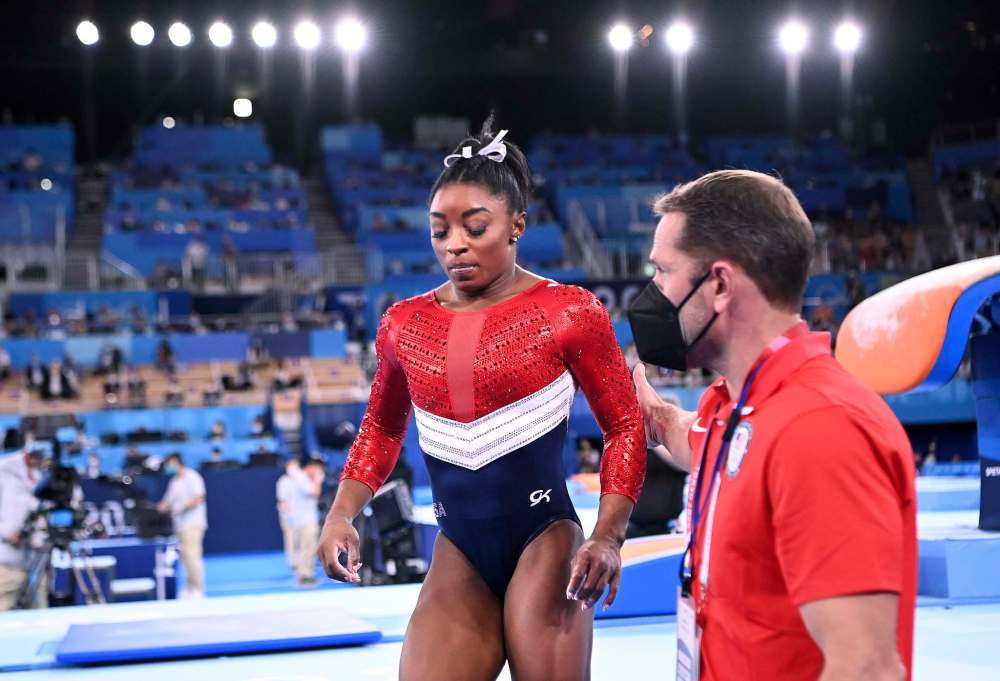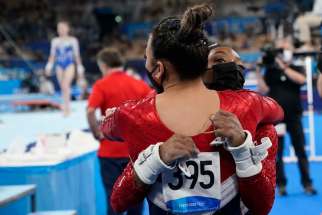Time to put mind at heart of sport
Read this article for free:
or
Already have an account? Log in here »
To continue reading, please subscribe:
Monthly Digital Subscription
$0 for the first 4 weeks*
- Enjoy unlimited reading on winnipegfreepress.com
- Read the E-Edition, our digital replica newspaper
- Access News Break, our award-winning app
- Play interactive puzzles
*No charge for 4 weeks then price increases to the regular rate of $19.00 plus GST every four weeks. Offer available to new and qualified returning subscribers only. Cancel any time.
Monthly Digital Subscription
$4.75/week*
- Enjoy unlimited reading on winnipegfreepress.com
- Read the E-Edition, our digital replica newspaper
- Access News Break, our award-winning app
- Play interactive puzzles
*Billed as $19 plus GST every four weeks. Cancel any time.
To continue reading, please subscribe:
Add Free Press access to your Brandon Sun subscription for only an additional
$1 for the first 4 weeks*
*Your next subscription payment will increase by $1.00 and you will be charged $16.99 plus GST for four weeks. After four weeks, your payment will increase to $23.99 plus GST every four weeks.
Read unlimited articles for free today:
or
Already have an account? Log in here »
Hey there, time traveller!
This article was published 27/07/2021 (1596 days ago), so information in it may no longer be current.
One of the best videos linked to the 2020 Summer Olympics was recorded not this strange week in pandemic-stricken Tokyo, but six years ago. Then-seven-year-old skateboarder Rayssa Leal landed a difficult heelflip trick while wearing a bright blue fairy princess dress, complete with sparkly wings.
The video went viral in 2015. It circulated again this week, when the 13-year-old Brazilian became Olympic skateboarding’s inaugural silver medallist, finishing second to Momiji Nishiya of Japan, also 13.
I don’t know anything about this but it’s awesome: a fairytale heelflip in Brazil by #RayssaLeal (via @oliverbarton) pic.twitter.com/uZgshHYMMT
— Tony Hawk (@tonyhawk) September 8, 2015
It was a reminder of the real heart of sport, the best of its essence. A little girl playing at the skills that will soon put her on top of the game, not with the focus of someone giving their lives to be great but with the freewheeling joy of a child.
After the competition, Rayssa was asked how it felt to win an Olympic medal. She giggled: “I want to go back to being the little girl I am… I don’t want to have responsibility. I want to go on being the lively little girl I am for all of Brazil.”
With luck, she may get to. Even at its most elite ranks, skateboarding has a famously relaxed and social culture. It’s a sport that, despite cash and attention, hasn’t forgotten it’s supposed to be fun.

Let’s hope the Olympic spotlight doesn’t change that. Because this week, the world saw the other end of the spectrum — where the pressure of sport becomes ugly, and young athletes give their all to entertain fans or represent countries which, in the end, don’t always have their back.
Consider the gasps when U.S. gymnastics icon Simone Biles withdrew from the team final, citing mental health. In retrospect, it was obvious. During her first vault, Biles bailed out of her intended skill and stumbled on the landing. Experts who have analyzed every minute of her career were rattled just to watch.
She experienced what gymnasts call getting lost in the air, which is when the athlete loses a sense of the precise position of their body as it twists and spins. In a sport where being an inch off judging a landing risks catastrophic injury, it’s dangerous.
Minutes later, the team announced Biles, the greatest female gymnast of all time, was done for the night. She has competed, and won, with kidney stones; this week, she competed on broken toes. But when she felt her mind was not healthy as it needed to be, she knew herself well enough to pull out.

Biles remained on the sidelines to cheer her teammates, offering encouragement and hugs. When the U.S. squad claimed silver, Biles joined it to speak to media, explaining she "didn’t want to risk the team a medal" due to her "screwups."
"I didn’t want to do something silly out there and get injured," the 24-year-old said. "It’s been really stressful, this Olympic Games as a whole… we’re just a little bit too stressed out. We should be out there having fun, and sometimes that’s not the case."
The social media reaction was swift and vehemently split.
Most fans and virtually all athletes praised Biles. Others responded with bitter invective, accusing her of "quitting on her team" or even her country, of being selfish, of being weak.
Some compared Biles, unfavourably, to Kerri Strug, the American gymnast who in 1996 vaulted to clinch a team gold on a severely injured ankle. She had to be carried to the podium by Bela Karolyi, the coach who’d made her do the vault, telling her (incorrectly) she had to in order for the team to win.
When Simone Biles withdrew, she was claiming a right for all athletes: the right to refuse.
The comparison should go the other way. Strug should never have been pushed to do it, and when she did, the admiration for her tenacity should have been tempered by disgust a young woman was put in that position.
When Biles withdrew, she was claiming a right for all athletes: the right to refuse.
It shouldn’t be a controversial right. Earlier this year, tennis star Naomi Osaka announced she would not participate in media interviews at the French Open to protect her mental health; for that, she was fined.
But why? Defining the exact responsibilities athletes have to the events that host them is a nuanced topic. The importance of guarding their own mental health is not. The demands made of elite athletes on and off fields of play are intense to the point of crushing; we have no right to ask they give more than they want.
Sport has consumed so many children and youth. It has left many of its former stars traumatized and broken.
Before the Tokyo Olympics, Biles gave what is now a telling interview to the New York Times, in which she talked about the toll gymnastics has taken on her body and her life. She described the "unreal" physical pain she often endures, and when a reporter asked her to name the happiest moment of her career, she was blunt.
"Honestly, probably my time off."
It’s time to take the human experience of top athletes seriously. Sport has consumed so many children and youth. It has left many of its former stars traumatized and broken. At its worst, it can be an environment rife with abuse.
So when athletes say "no," they should be applauded.
So when athletes say “no,” they should be applauded.
Biles didn’t give up on her team: she stood beside it. Most importantly, as a fan on Twitter aptly said, she didn’t give up on herself: she rightly prioritized her well-being and safety over being only an object of consumption for armchair athletes.
Much is made of star athletes being role models. They shouldn’t have to wear that burden in everything that they do. If they must, let’s ask what the point of a role model is and what values we want our youth to learn from them.
Perseverance and determination. Confidence in one’s voice, too.
Knowing when to go forward but also when to step back. Knowing how to name one’s boundaries and then protect them, even under the weight of imaginable pressure. These are signs of courage, not weakness. Strength, not selfishness.
If you want a role model to inspire little girls, look to the woman brave enough to say "no."
melissa.martin@freepress.mb.ca
Our newsroom depends on a growing audience of readers to power our journalism. If you are not a paid reader, please consider becoming a subscriber.
Our newsroom depends on its audience of readers to power our journalism. Thank you for your support.








